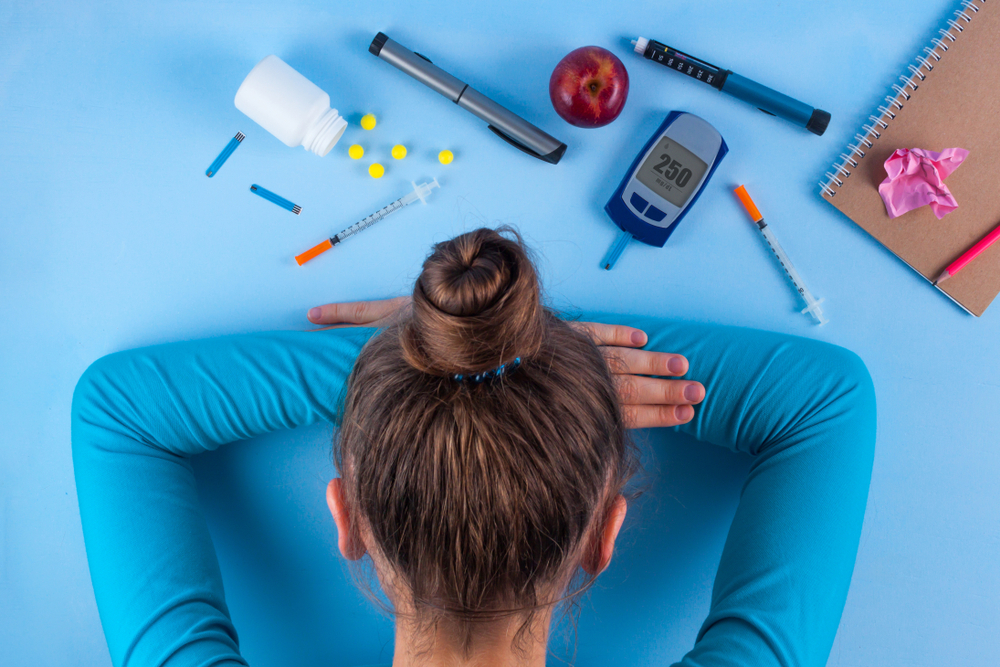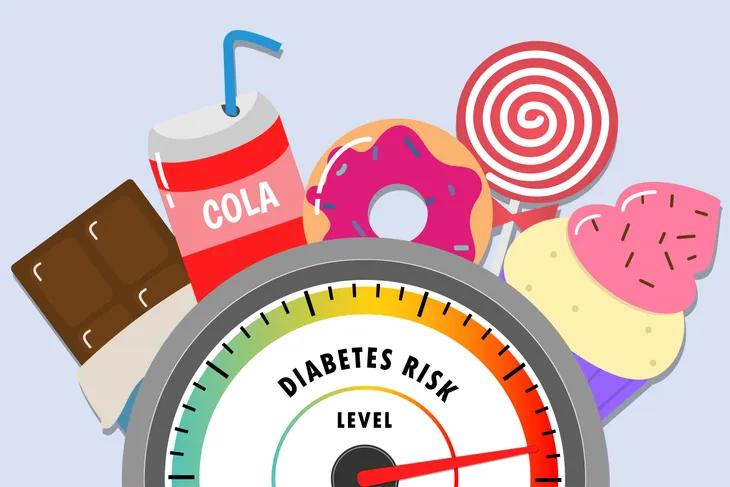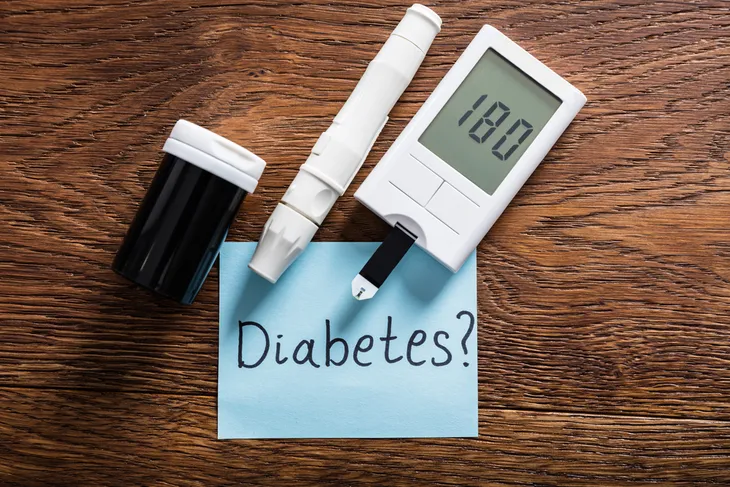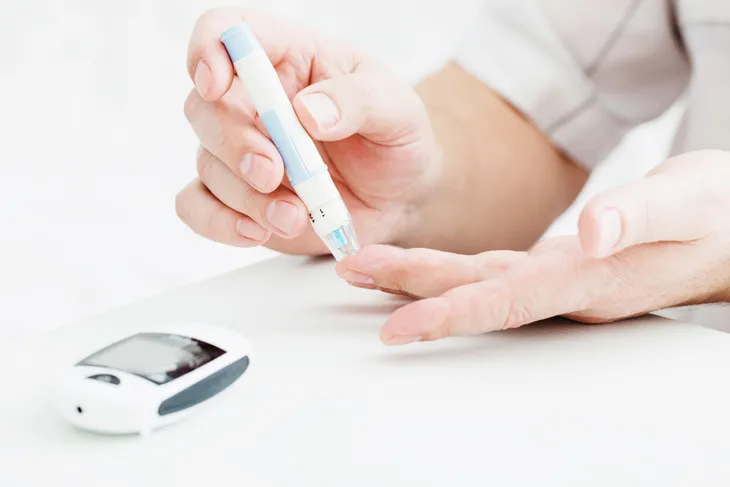Diabetes is a serious disease that, if left untreated or ignored, can have very serious health consequences, from loss of eyesight to amputation and even death. The good news is that managing diabetes isn’t that difficult, so long as you have a thorough understanding of the disease, how it affects you in particular, and the lifestyle changes required to keep you feeling and looking healthy.
Part of that education about diabetes involves learning the myths and facts about this increasingly prevalent disease. Now, let’s take a look at some crucial and surprisingly popular myths pertaining to diabetes.
Want diabetes content delivered straight to your inbox? Sign up for our Diabetes newsletter and receive exclusive news and articles written from our team of diabetes experts.
It’s Caused by Consuming Too Much Sugar
Many people believe that, in the same way working in a coal mine without protection can cause lung cancer, eating too much sugar leads to diabetes. But the emergence of diabetes is usually far more complicated than that and depends on a variety of factors, including fitness level, family health history, and other health matters affecting an individual.
In truth, eating too much sugar tends to lead to one becoming overweight and possibly obese, conditions that can, but may not always, lead to the development of type 2 diabetes. But that remains simply an association and excessive consumption of sugar can’t be directly linked to the emergence of diabetes. As for type 1 diabetes, it typically develops at birth, so it has virtually nothing to do with sugar.
Skinny People Can’t Get Diabetes
It’s true that eating in an unhealthy way and failing to get sufficient exercise can lead to one becoming overweight or obese, both of which increases an individual’s chances of developing type 2 diabetes. But that doesn’t mean that only overweight or obese people face the prospect of getting diabetes.
The fact is that many thin people can develop high blood-sugar levels and acquire diabetes. Genetics play a role here, with many people having a predisposition to low body weight but not necessarily an aversion to type 2 diabetes. Should you lead an unhealthy lifestyle that involves excessive consumption of sugar and little to no exercise, you could develop type 2 diabetes, regardless of how much you weigh.
Only Older People Get Diabetes
While it’s true that type 2 diabetes is more likely to be found in older people, largely because a range of health issues can make it more difficult to remain in shape, it’s far from impossible for a younger person to acquire this disease. In fact, the United States is currently facing a startling rising rate of childhood diabetes.
The truth is that just about anyone can acquire type 2 diabetes, with chances of developing the disease increasing based on one’s diet, fitness level, and family health history. Anyone who does not get regular exercise, eats a lot of unhealthy, highly processed foods, and has a family history of diabetes should be aware of the threat they face from a young age.
Diabetics Should Avoid Exercise
There’s a perception that people diagnosed with type 1 or type 2 diabetes are more fragile and should avoid intense exercise. But this is a dangerous myth that could result in the development of even more serious health problems for an individual diagnosed with diabetes.
In truth, regular physical exercise is helpful in maintaining healthy blood sugar levels and, in doing so, can play an important role in helping an individual manage their diabetes. That said, exercising can have a direct impact on blood sugar levels, so it’s important to have a conversation with your doctor about your fitness plan and get their input on how you can pursue your weight loss or weight maintenance goals without causing any health issues.
It’s Hard to Detect Diabetes
Compared to some other health conditions, diabetes can be relatively hard to detect. Unlike a serious heart condition, it probably won’t leave you feeling seriously exhausted, sick to your stomach, or result in excruciating chest pain. But there are some signs to look out for, particularly for anyone with a family history of diabetes.
Some symptoms of diabetes include feeling dehydrated even after drinking lots and lots of water; frequent visits to the restroom to urinate; feeling hungry a lot of the time; and unexpected or unexplained fluctuations in weight. Should a couple of these symptoms emerge, you should talk to your doctor about being tested for diabetes. If you do an annual check up, always ask for a A1c and fasting sugar reading. This way you can track your potential risk of developing prediabetes or detect diabetes early.
Pregnancy is a Problem for Diabetics
Many women with diabetes are concerned that getting pregnant will result in a particularly difficult pregnancy for them and their baby or having their baby start life with their own diabetes diagnosis. Thankfully, that’s rarely the case, with most diabetic women having pregnancies that are not dramatically different than their non-diabetic counterparts.
That said, women with diabetes do face a slightly elevated risk of developing some kind of complication during their pregnancy, so it’s especially important that they regularly visit their doctor for checkups as their baby’s birth date approaches. Additionally, to ensure a pregnancy goes its full term, rather than having the child born prematurely, pregnant women with diabetes need to stay on top of their blood sugar levels, which usually means eating well and regularly conducting blood sugar tests.
It’s Easy to Monitor Blood Sugar
People who have lived with diabetes for many years can become rather acquainted with their condition and have a good idea of exactly when their blood sugar levels become too high or too low. But the reality is that many diabetics will not know when this occurs, which means they must remain vigilant about checking their blood sugar levels.
To maintain healthy blood sugar levels, watch your consumption of sugar — both natural and processed — and be sure to get regular physical exercise. Also, get to know some of the physical symptoms of blood sugar problems, such as exhaustion, shakiness, and excessive sweating. Also, be aware that your condition could be much different than someone else’s, so don’t rely on another individual’s diabetes symptoms to judge your own.
Eventually You Won’t Need to take Blood Sugar Tests
While people who have had diabetes for a prolonged period of time, such as a decade or more, tend to understand their condition and its symptoms better than those who have been only recently diagnosed, the truth is that it’s possible for long-term diabetics to lose their sense of when their blood sugar levels are off.
This unique condition is known as “hypoglycemia unawareness” and can affect individuals who have had diabetes for a long time. In effect, it means an individual loses the ability to detect the symptoms of diabetes, placing them in danger of the many serious health conditions that can arise when blood sugar levels are not kept in a safe range. If you’ve had diabetes for many years and find it harder to track your blood sugar, talk to your doctor about hypoglycemia awareness.
Diabetics Can’t Eat Sugar
Because we so often associate diabetes with sugar consumption, many people assume that they can no longer enjoy their favorite sweet treats following a diabetes diagnosis. And while it’s true that individuals with diabetes must always be aware of their blood sugar levels and therefore must watch how much sugar they consume, by no means are they not allowed to eat foods or beverages containing sugar.
Rather, every individual will react differently to the consumption of sugar, with some diabetics having to stiffly curtail its consumption and others not having to be quite so careful. Learning your tolerance for sugary foods will require regular blood sugar testing, some experimentation, and regular honest conversations with your doctor.
Diabetics Have Weak Immune Systems
Many diseases place a huge strain on the body; as a result, they can effectively weaken the immune system and make an individual more likely to acquire both serious and relatively minor health conditions. But is this the case for people with diabetes? For example, can they expect to get more head colds than the people around them who don’t have diabetes?
The short answer is simply “no.” Diabetics generally do not have weaker immune systems, which means they’re no more likely to pick up a head cold or the flu than anyone else. That said, people with diabetes can react differently to both serious and less serious health issues, including the common cold, so they should plan to visit their family doctor any time they’re affected by a condition of this kind.
Only People with a Family History of Diabetes Can Get It
While it’s true that genetics, including a family health history of diabetes, can play a direct part in determining if one will acquire type 1 or type 2 diabetes, in reality even people with no family history of diabetes can acquire the disease. At the same time, it’s also possible for people with a strong family history of diabetes to avoid getting the disease by being vigilant about maintaining a healthy body weight and being disciplined about their consumption of all types of sugar.
The best course of action is this: if you have family members with diabetes, you should recognize that you’re at an increased risk of developing the disease and should get regular check-ups to see if your health picture has changed. As for those who have few or no family members with diabetes, don’t assume you’re immune and be aware of the various symptoms of diabetes.
Diabetes Affects Everyone in the Same Way
Arguably, there’s no more dangerous myth than the one which states that anyone and everyone with diabetes will face the same challenges. Like so many other health conditions, it affects every individual in a unique way.
In reality, that means two close family members, such as a mother and son, could have radically different experiences with diabetes. They could have drastically different symptoms and consequences for failing to follow a diet and exercise regimen set out by their doctors. To be safe, never assume that someone else’s experience with diabetes will be similar to your own, and take suitable steps to accommodate this.















